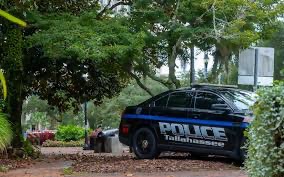 In 2020, Tony McDade, a Black transgender man, started dating Jennifer Jackson, the mother of Malik Jackson. On May 25, 2020, McDade broke into Jackson’s house and hit Jackson with a gun. On May 26, 2020, McDade allegedly returned to Jackson’s house and started using foul language. This resulted in a fight between Malik Jackson and other family members of Jackson.
In 2020, Tony McDade, a Black transgender man, started dating Jennifer Jackson, the mother of Malik Jackson. On May 25, 2020, McDade broke into Jackson’s house and hit Jackson with a gun. On May 26, 2020, McDade allegedly returned to Jackson’s house and started using foul language. This resulted in a fight between Malik Jackson and other family members of Jackson.
In the morning of May 27, 2020, McDade went live on Facebook to describe being jumped by a group of men. He claimed that the incident started as a one-on-one fight before an insult led to the addition of four other men jumping in. McDade promised retaliation and claimed to be armed and ready to fight one of the men.
The Tallahassee Police Department asserts that on May 27, 2020, they approached McDade as a potential witness in the deadly stabbing of Malik Jackson earlier that day. Lawrence Revelle, the department’s police chief, told reporters that communications by the radio frequency said that McDade had pointed a gun at the responding officer and that “a bloody knife was located at the scene, and the suspect was in possession of a firearm.” This was contested by witnesses, who claimed that the officers shouted, “Stop moving, nigger!” before shooting McDade. Additionally, the witnesses state that no officers ever introduced themselves or first ordered McDade to cease acting in a certain way.
McDade, was shot and killed by a Tallahassee police officer. Following the shooting, the Florida Police Benevolent Association sued the city of Tallahassee to keep the names of two officers, including the one who is thought to have shot McDade, from being made public. The police union argued that the officers’ identities should be protected under Marsy’s Law, a Florida constitutional amendment that safeguards the privacy of crime victims, despite the fact that some witnesses appear to dispute the police union’s claim that McDade threatened the officers with a gun. The amendment, which was passed in 2018, has been seriously contested for the first time in this case. A trial court found in favor of the city in July 2020, concluding that law enforcement officials working in the course of their official duties should not be subject to the language of Marsy’s Law. The police union filed an appeal, and the appeals court overturned the lower court’s ruling while questioning the judge for creating a Marsy’s Law exception.
 The Florida District Court of Appeal held that: (1) An officer “meets the definition of a crime victim under Art. I, 16 when a crime suspect threatens the officer with deadly force, placing the officer in fear for his life”; (2) Constitutional victims’ rights protections attach before criminal proceedings start; and (3) Identifying information about the officers was exempt from disclosure under public records laws. The city of Tallahassee appealed to the Florida Supreme Court and oral arguments have been heard. A decision has not been reached. It is unlikely that the Florida Supreme Court will reverse the decision because the plain language of Marsy’s Law does not state an exemption to police officers.
The Florida District Court of Appeal held that: (1) An officer “meets the definition of a crime victim under Art. I, 16 when a crime suspect threatens the officer with deadly force, placing the officer in fear for his life”; (2) Constitutional victims’ rights protections attach before criminal proceedings start; and (3) Identifying information about the officers was exempt from disclosure under public records laws. The city of Tallahassee appealed to the Florida Supreme Court and oral arguments have been heard. A decision has not been reached. It is unlikely that the Florida Supreme Court will reverse the decision because the plain language of Marsy’s Law does not state an exemption to police officers.



 In 2020, Tony McDade, a Black transgender man, started dating Jennifer Jackson, the mother of Malik Jackson. On May 25, 2020, McDade broke into Jackson’s house and hit Jackson with a gun. On May 26, 2020, McDade allegedly returned to Jackson’s house and started using foul language. This resulted in a fight between Malik Jackson and other family members of Jackson.
In 2020, Tony McDade, a Black transgender man, started dating Jennifer Jackson, the mother of Malik Jackson. On May 25, 2020, McDade broke into Jackson’s house and hit Jackson with a gun. On May 26, 2020, McDade allegedly returned to Jackson’s house and started using foul language. This resulted in a fight between Malik Jackson and other family members of Jackson. The Florida District Court of Appeal held that: (1) An officer “meets the definition of a crime victim under Art. I, 16 when a crime suspect threatens the officer with deadly force, placing the officer in fear for his life”; (2) Constitutional victims’ rights protections attach before criminal proceedings start; and (3) Identifying information about the officers was exempt from disclosure under public records laws. The city of Tallahassee appealed to the Florida Supreme Court and oral arguments have been heard. A decision has not been reached. It is unlikely that the Florida Supreme Court will reverse the decision because the plain language of Marsy’s Law does not state an
The Florida District Court of Appeal held that: (1) An officer “meets the definition of a crime victim under Art. I, 16 when a crime suspect threatens the officer with deadly force, placing the officer in fear for his life”; (2) Constitutional victims’ rights protections attach before criminal proceedings start; and (3) Identifying information about the officers was exempt from disclosure under public records laws. The city of Tallahassee appealed to the Florida Supreme Court and oral arguments have been heard. A decision has not been reached. It is unlikely that the Florida Supreme Court will reverse the decision because the plain language of Marsy’s Law does not state an